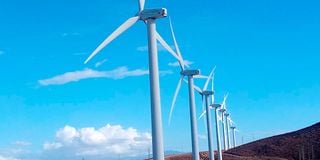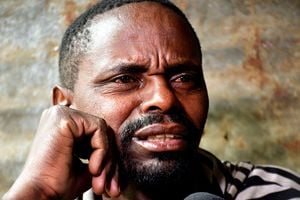150 countries fall short on 2030 renewable energy goal

Wind turbines. Wind power is a clean and renewable energy source.
What you need to know:
- Europe emerges as a powerhouse, contributing roughly 20 per cent of the global renewable energy ambition.
- Due to their draft national energy and climate plans, EU member states account for over 80 per cent of this regional contribution.
Nearly 150 countries are falling short of the ambitious target to triple renewable energy capacity by 2030, a new report shows. The International Energy Agency (IEA) report comes barely a year after more than 100 countries signed a pledge during the 28th Conference of Parties (COP28) to boost their renewable energy capacities.
This move was meant to help in the shift from fossil fuels to renewable energy sources. The report dubbed ‘COP28 Tripling Renewable Capacity Pledge: Tracking Countries' Ambitions and Identifying Policies to Bridge the Gap’, now throws a curveball at these aspirations.
The report reveals that despite signing the Paris Agreement, this delay in embracing renewable energy jeopardises the global energy transition goal and by extension, countries’ ability to combat climate change.
The report acknowledges progress in the transition, showing that if we implement current national plans, the world will achieve roughly 70 per cent of the progress needed for the COP28 goal.
Still, a significant 30 per cent gap will remain, translating to missed opportunities to curb greenhouse gas emissions, mitigate climate change's worst effects and build a cleaner, more sustainable future.
It further highlights that global renewable energy capacity additions are accelerating. In 2023 alone, the report shows that new capacity additions reached a record-breaking 560 GW (gigawatts), a 64 per cent increase from the previous year. This momentum aligns with the pace needed to achieve nearly 8,000 GW of installed renewable capacity by 2030, reflecting countries' current goals.
The IEA report recommends collective action to bridge the gap and reach the ambitious COP28 target. It notes that almost 50 countries are on track to meet or exceed their current plans, but more is needed to achieve the target.
Several factors impede progress, including the slow pace of policy development and implementation. Delayed permitting times for renewable energy projects and lengthy bureaucratic procedures create delays and uncertainties for investors, hindering project development. Insufficient investment in electricity grids remains a significant bottleneck.
Integrating renewable energy sources like solar and wind into existing grids requires upgrades and expansion. Financing costs remain a barrier, especially for developing nations, since the transition to renewables requires readily available and affordable financing.
On the flipside, the IEA report shows that several countries are on track to double their renewable energy capacity by 2030. Their success underscores a crucial point: with the right policies and concerted global action, the ambitious COP28 target remains achievable. Nearly 30 countries aim to increase their renewable capacity by two to three times by 2030, accounting for almost three-quarters of global ambition, led by China, the United States, India, Germany and Spain.
Europe emerges as a powerhouse, contributing roughly 20 per cent of the global renewable energy ambition. Due to their draft national energy and climate plans, EU member states account for over 80 per cent of this regional contribution. China, a global frontrunner, installed a staggering 350 GW of new renewable capacity in 2023, over half the global total.
The United States and Canada aim for a combined 1,000 GW of renewable capacity by 2030, representing 13 per cent of the global ambition. Southeast Asia, the Middle East, North Africa and Sub-Saharan Africa must scale up their ambitions. The IEA report emphasises the critical role of robust Nationally Determined Contributions (NDCs) in bridging the current renewable energy gap.
NDCs are national climate action plans that countries submit under the Paris Agreement. The report highlights a positive trend, with 95per cent of NDCs referencing "renewable" energy or specific renewable technologies, indicating a global recognition of their importance in mitigating emissions.
The IEA offers a clear roadmap to accelerate renewable energy deployment. It says countries need a strong signal of commitment, like multi-year roadmaps or guaranteed tariffs. Streamlining permitting processes is crucial. This multi-pronged approach involves simplifying regulations, ensuring relevant departments are adequately staffed with expertise and investing in spatial planning to expedite zoning approvals. Furthermore, involving local communities fosters engagement and reduces permitting delays.
The report recommends incentivising responsive generation and expanding energy storage capacity to create a more flexible grid that can handle variable renewables. Additionally, leveraging digitalisation for demand response programmes can further balance supply and demand fluctuations.
Reducing financing costs is critical to improving project "bankability." It will extend long-term policy visibility, support pre-development projects and mitigate risks for investors and off-takers while ensuring consumer affordability. By following this roadmap, countries can unlock the full potential of clean energy and achieve a sustainable future.





